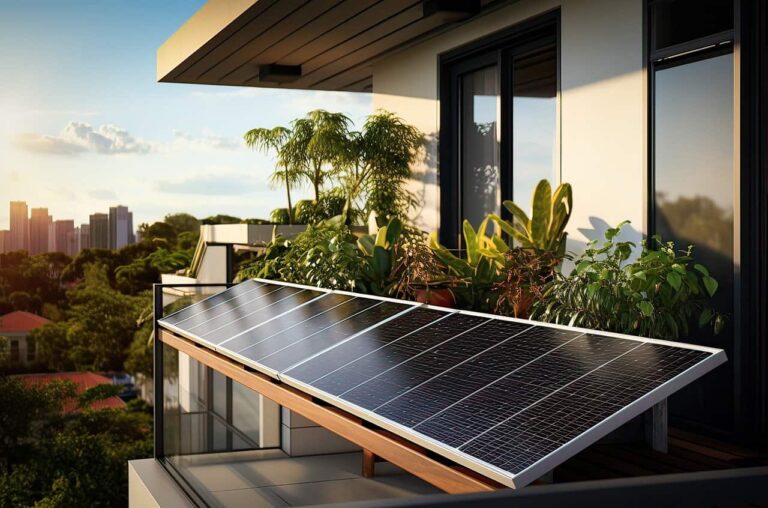In an era marked by an increasing global emphasis on environmental consciousness, the quest for sustainable and renewable energy solutions has gained paramount significance. Solar power, basking in the limelight as an accessible choice for individual households, is witnessing a surge in popularity.
While conventional solar panels typically necessitate ample rooftop real estate, a novel innovation has gracefully entered the scene: balcony solar panels. We will explore the essence of balcony solar panels, discerning their distinctions from their traditional counterparts and unveiling the myriad advantages they present to those who accept them.
Table of Contents
What are balcony solar panels?
Balcony solar panels, also known as mini solar systems, are compact and highly efficient. They provide a solution for harnessing solar energy to generate your own electricity supply. They are an ideal resource for individuals lacking a suitable roof or garden space conducive to conventional solar installations.
Installing balcony solar panels is a straightforward process, involving simply clipping these panels onto balcony railings and plugging them in. Their ease of installation renders them a DIY-friendly option, eliminating the need for professional solar installers.
Remarkably, balcony solar panels can generate power of up to approximately 400 watts. This power output can last for 6-7 hours, or it can be used to supply energy for illuminating a mid-sized household using LED bulbs. Furthermore, their portability is a notable feature, allowing users to take them along when relocating from one apartment to another.
Another noteworthy aspect of terrace solar panels is their adaptability. They can be seamlessly connected to a power station or the mains, affording users the flexibility to either charge the power station. Alternatively, depending on the prevailing economic considerations, they can contribute surplus electricity to the grid. This adaptability empowers individuals to make energy choices that align with their immediate needs and financial goals.
Read more: Europe, new milestone on renewables: solar power outperforms coal
How do balcony solar panels differ from the conventional ones?
Balcony solar panels stand out from their conventional counterparts in several key aspects. Here are some of the notable differences:
- Ease of installation: Balcony solar systems take the lead in terms of installation simplicity. Unlike traditional solar setups, which often involve complex rooftop or ground-mounted installations, balcony solar panels offer a simpler solution. They can be effortlessly clipped onto balcony railings. Once in place, they can be readily plugged in for use;
- Size and weight: Balcony solar panels are distinguished by their smaller, more compact profiles. Conventional solar panels are typically heavy and bulky because they are often made from glass. This makes them impractical for balcony installation due to weight constraints and limited space;
- Portability: The portability factor emerges as a defining feature of balcony solar systems. They can be conveniently relocated and taken along when you move out of an apartment. This offers a level of mobility that conventional solar setups cannot match;
- Power output: While terrace solar panels offer numerous advantages, they typically exhibit a lower power output than their conventional counterparts. This variance in power generation capacity is an important consideration, as it may impact their suitability for specific energy needs and situations.
The 7 benefits of balcony solar panels
The surging popularity of balcony solar panels stems from their capacity to provide an eco-conscious and cost-effective means of meeting your electricity requirements. Solartech claims that a balcony solar panel covering can efficiently generate around 400 watts of power.
This energy can power equipment for 6-7 hours or illuminate a mid-sized residence using energy-efficient LED bulbs. Here, we enumerate seven compelling benefits associated with deck solar panels:
- Energy savings: Balcony solar panels empower you to generate your electricity, directly reducing your electricity bills thereby fostering substantial energy cost savings;
- Environmental friendliness: The utilisation of clean energy from balcony solar panels contributes to a noteworthy reduction in CO2 emissions. By relying on renewable energy, you actively participate in the reduction of fossil fuel consumption and its associated environmental impact;
- Flexibility: Tenants and property owners benefit from balcony solar systems, which offer a versatile solution that you can conveniently dismantle and transport when you relocate;
- 24/7 clean energy: These solar panels harness the inexhaustible power of the sun to generate clean and renewable energy for your abode. They ensure a constant supply of sustainable electricity;
- Low maintenance: Solar panels are well-known for needing very little maintenance. This results in low upkeep costs, which ultimately makes them cost-effective in the long run;
- Increased property value: The installation of solar panels can augment the overall value of your property, enhancing its market appeal and potentially commanding a higher resale price;
- Reliability: Solar panels boast a reliability quotient that’s second to none. With no moving parts to contend with, they exhibit remarkable durability and have an extended operational lifespan.
Read more: Exploring the 7 largest solar fields worldwide: what is their contribute to green energy production












